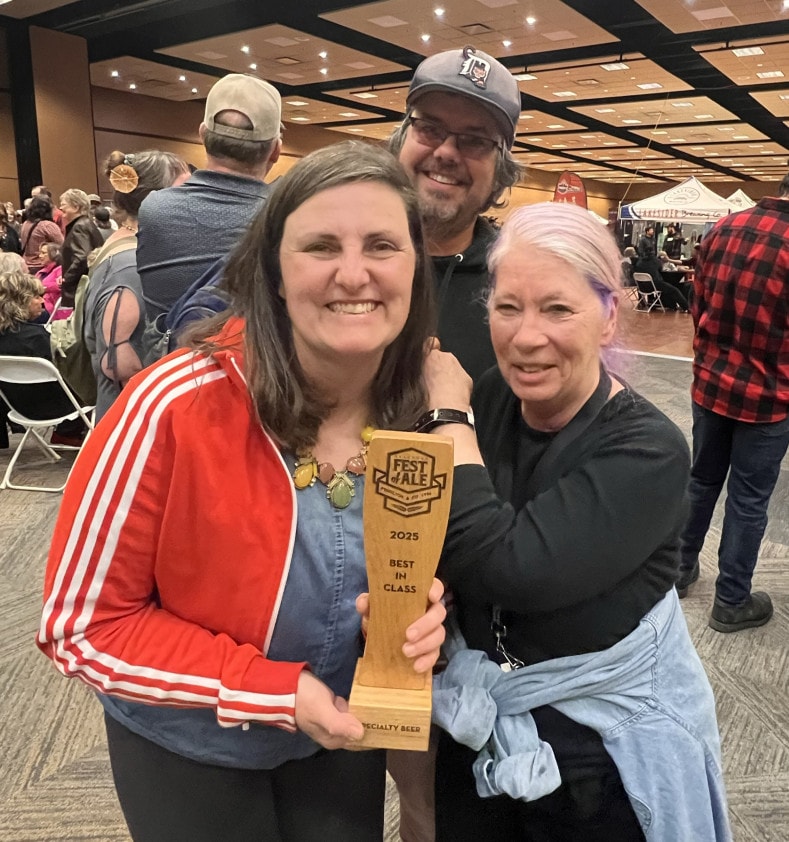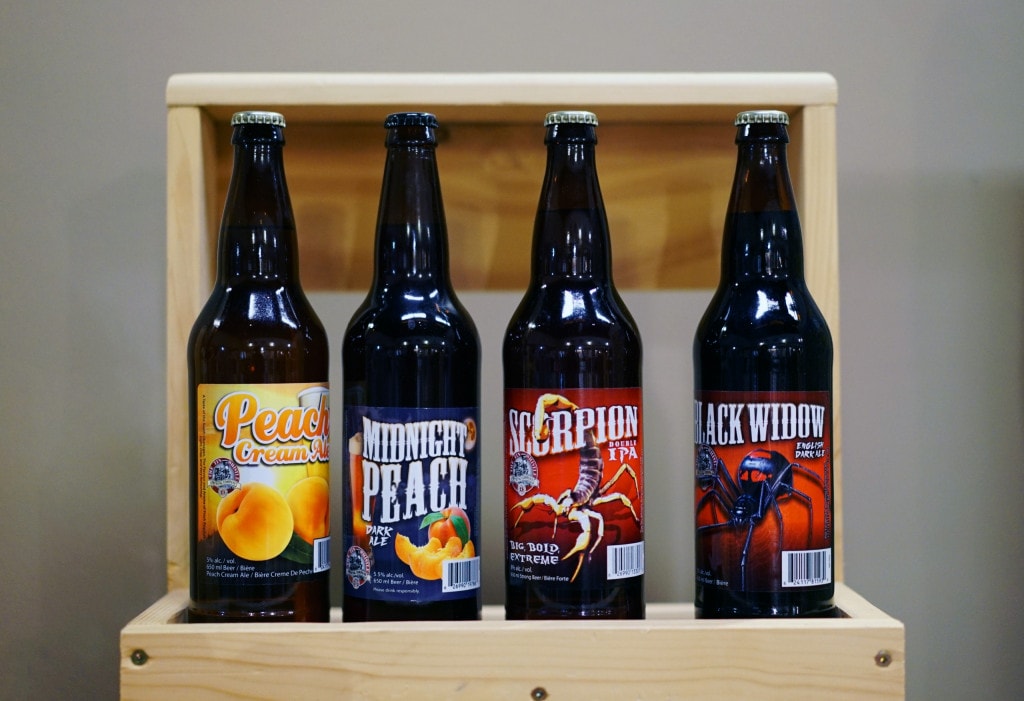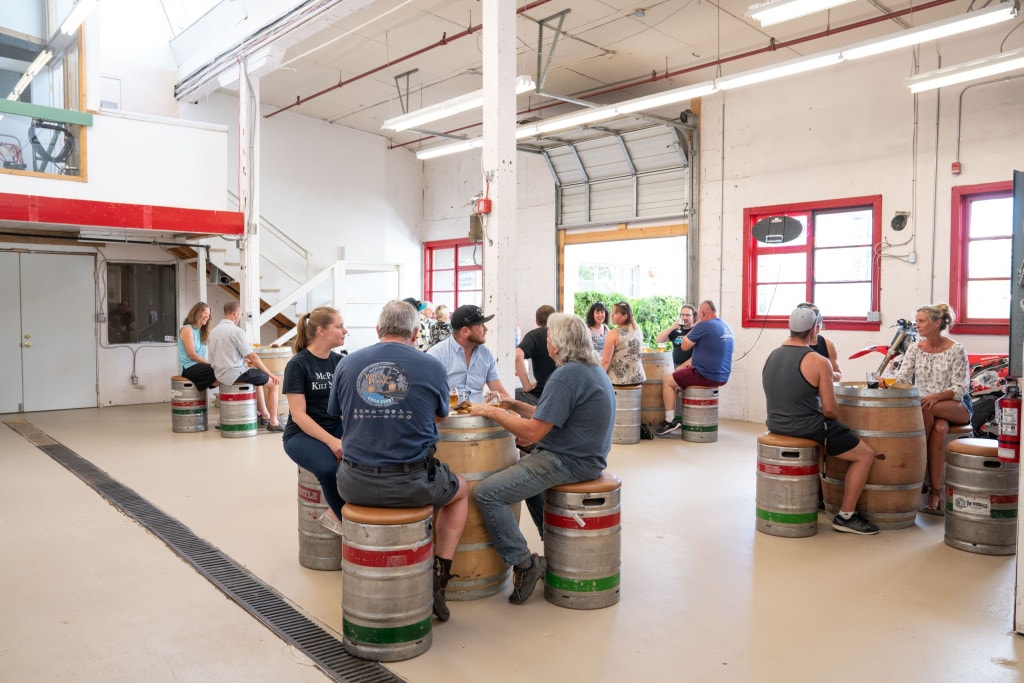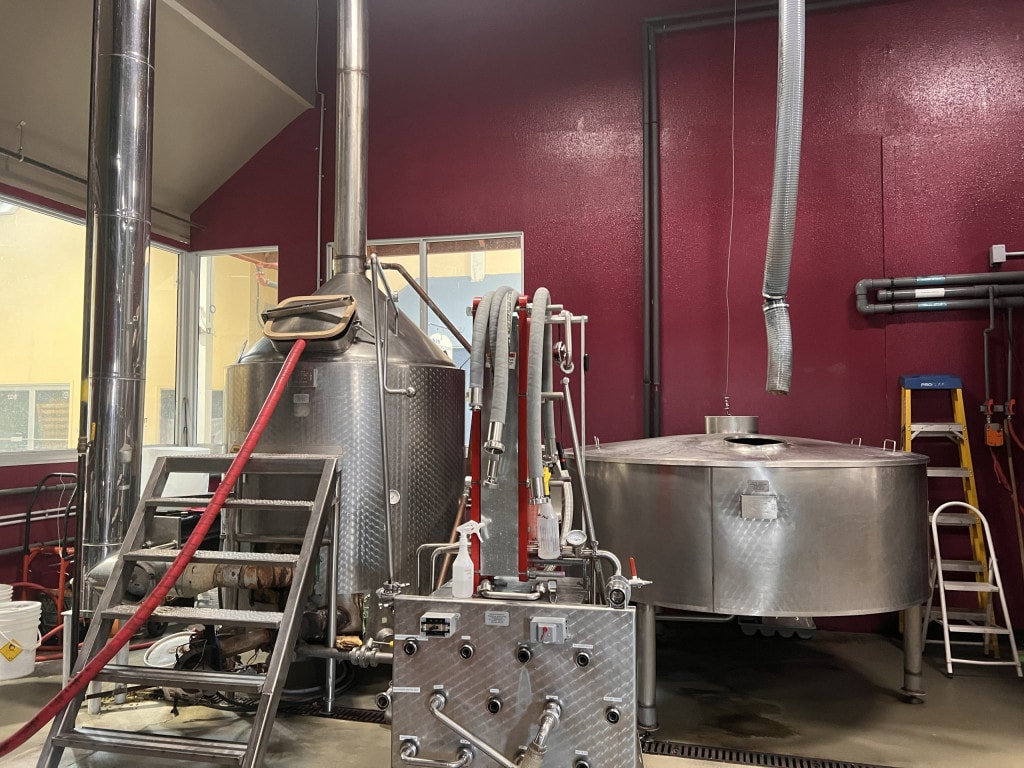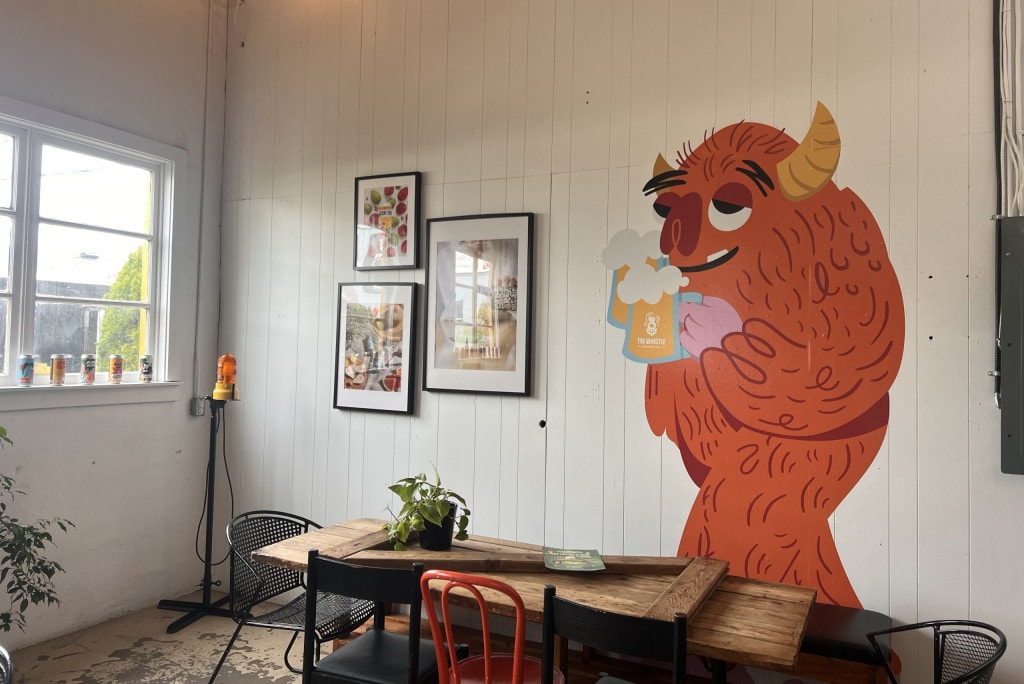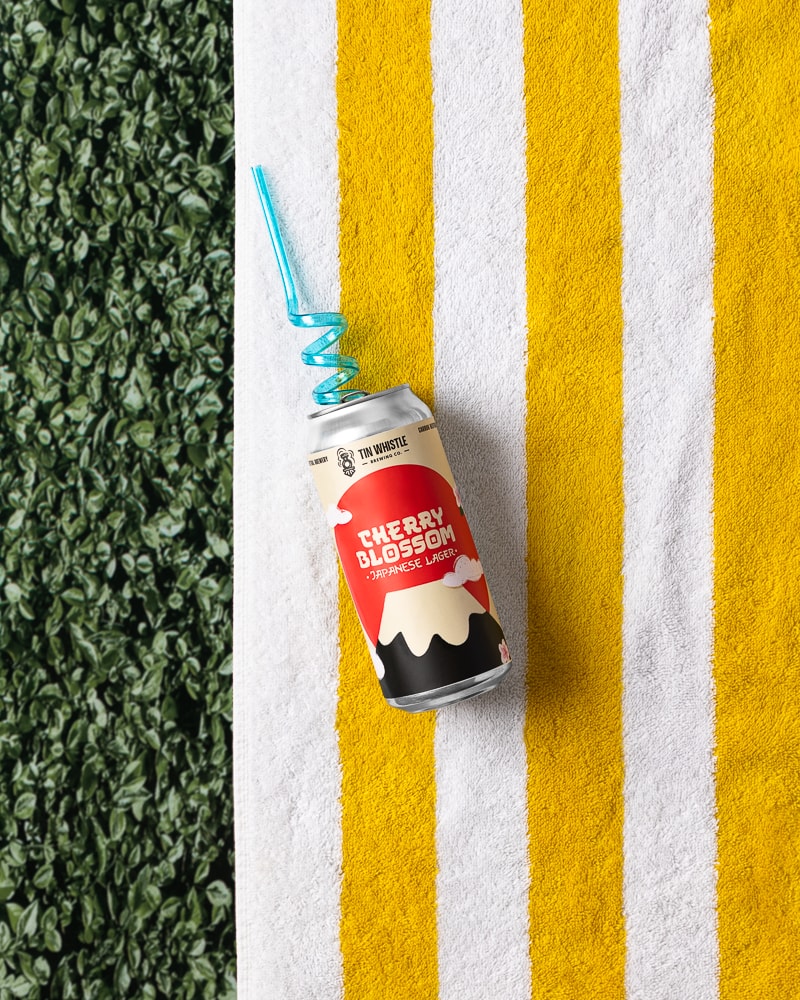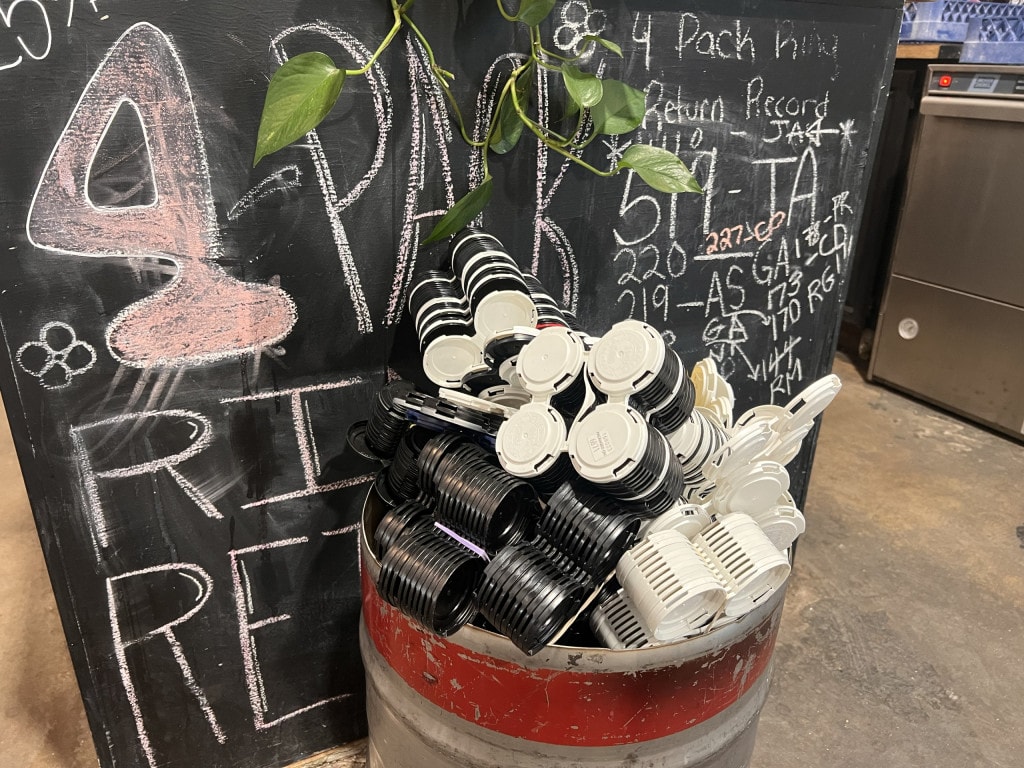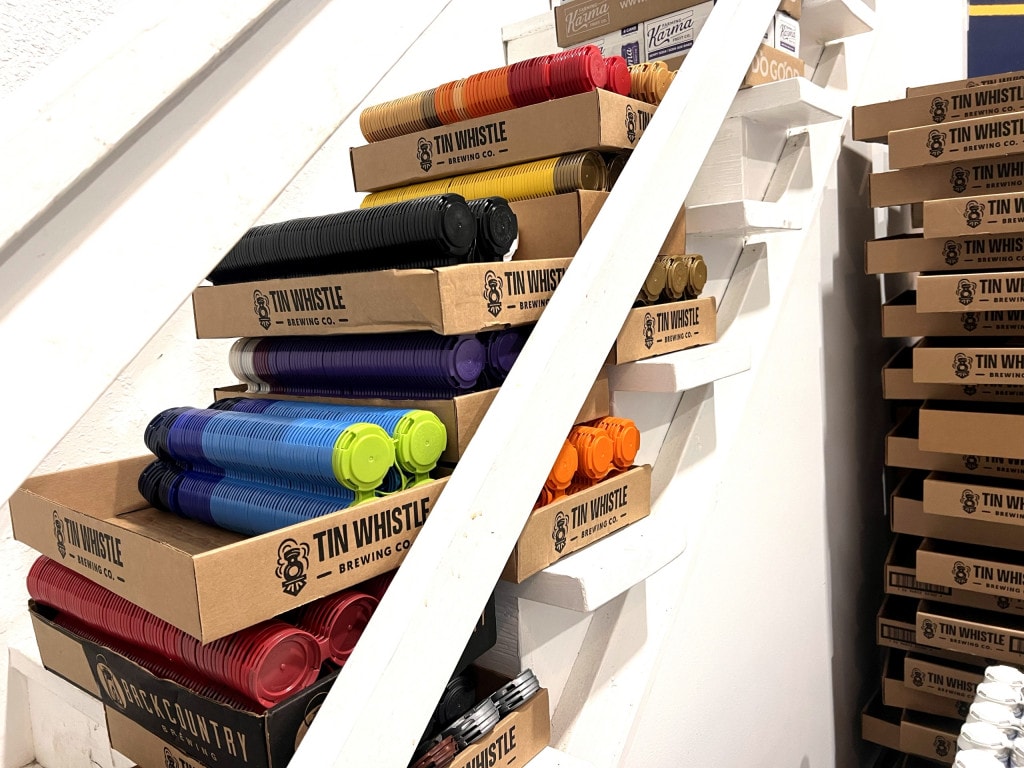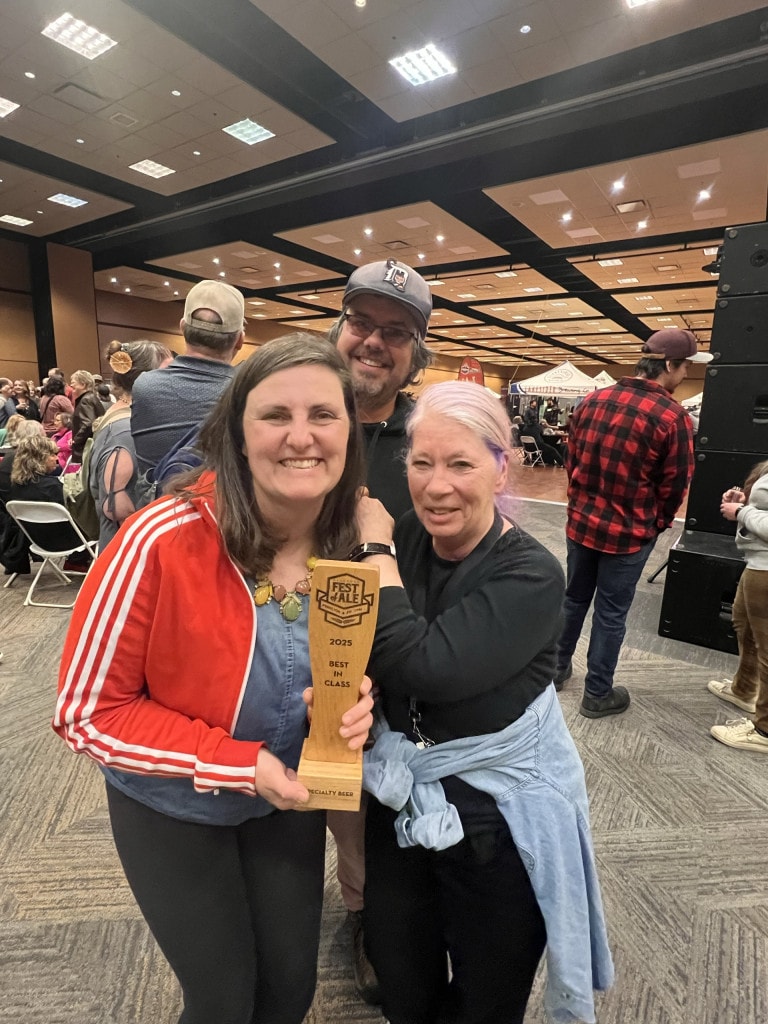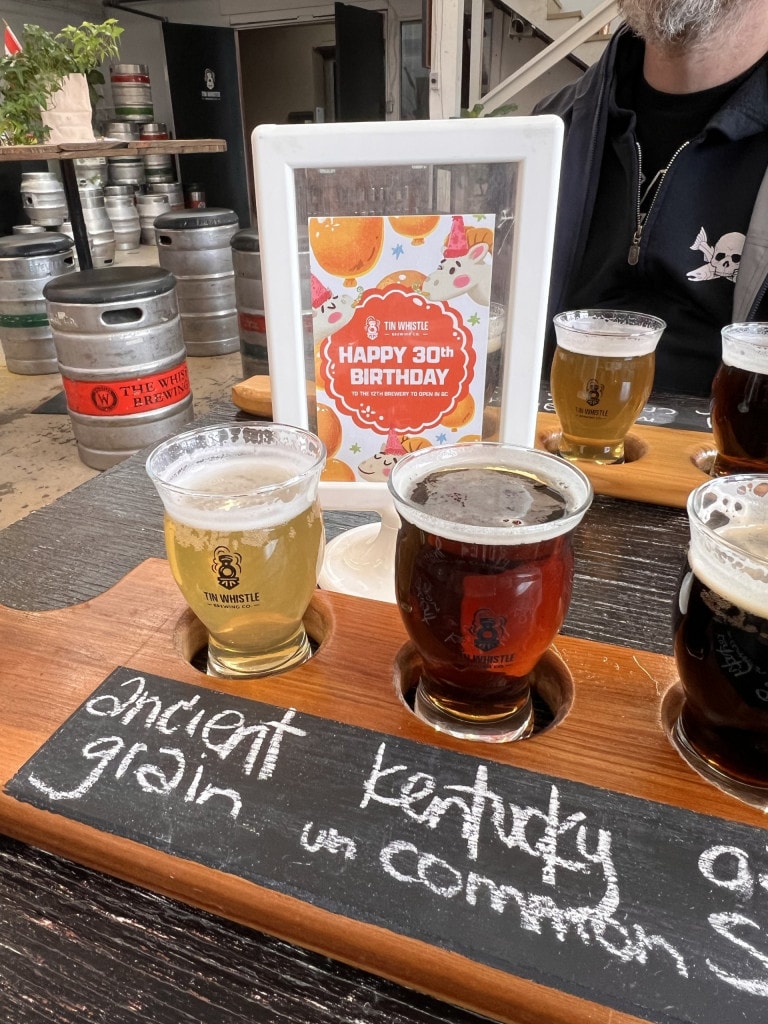Tin Whistle Brewing Co. first opened its doors way back in 1995 – an incredible 30 years ago!
Tin Whistle is not only Penticton’s first craft brewery, but also the first in the South Okanagan region, and BC’s 12th craft brewery. Over their incredible history, they’ve won many awards, modernized and grown their branding through two ownership changes (notably, it has always had women within the ownership teams), and have also had the distinction of becoming a zero-waste facility and Canada’s first carbon neutral brewery under the leadership of current owners Alexis Esseltine and Tim Scoon. I was fortunate to spend some time chatting with Alexis about the brewery’s milestone birthday recently, as well as their ongoing focus on sustainability and how they hope to inspire the craft beer industry.
To celebrate 30 years, Tin Whistle will be releasing 12 brews over the course of the year. “This year is going to be one big celebration,” says Tim. “We are going to brew this incredible line-up of limited edition, small run beers and release them out into the world every month. We dug into the Tin Whistle archives to bring back long lost recipes, and looked deep into beer history to bring light to fascinating styles that are uncommon, but oh so delicious. And we’ve looked ahead to what we think beer can be with new ingredients and approaches to brewing. You won’t want to miss a single one.”
But let’s start at the beginning, shall we?
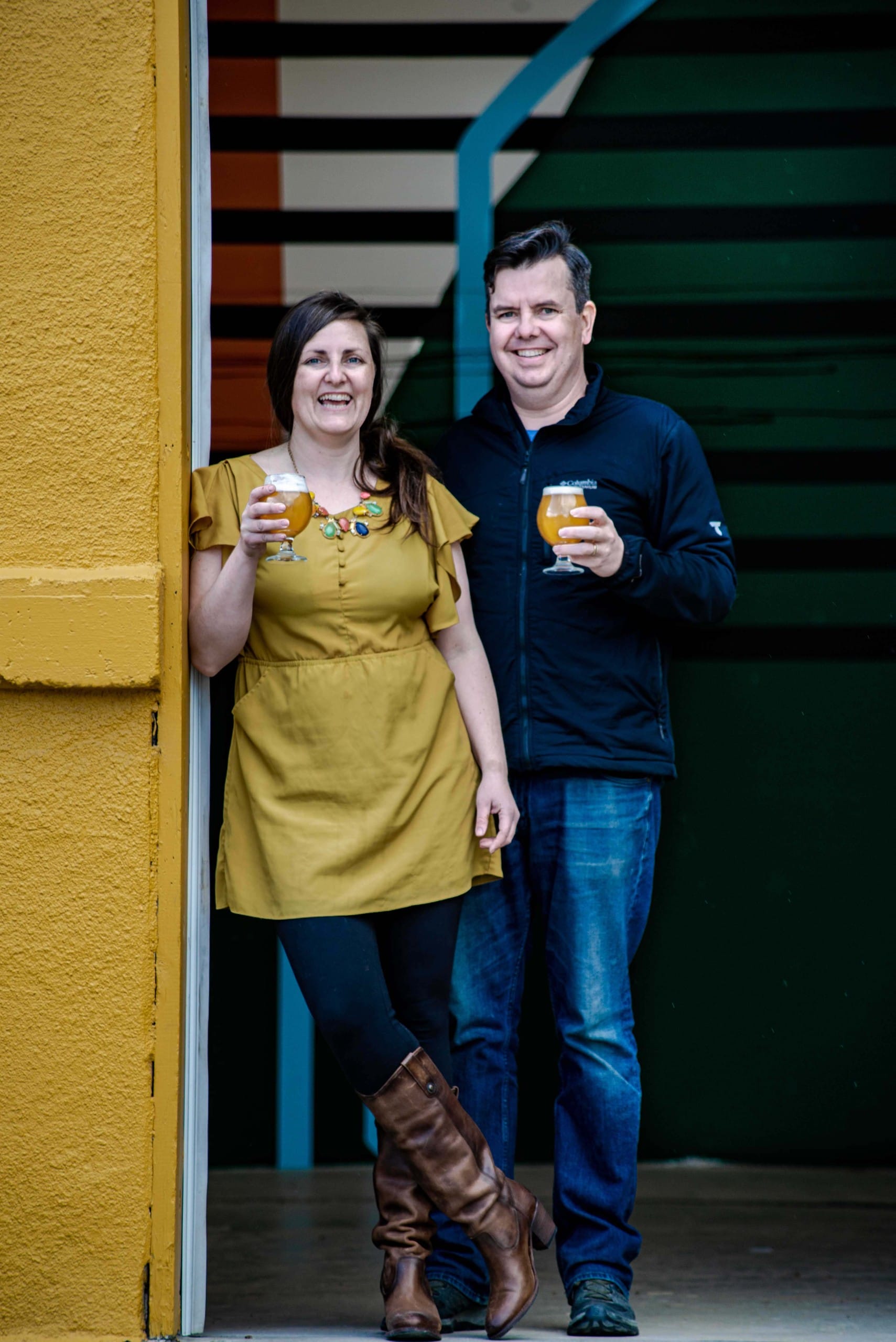
A Brief History of Tin Whistle Brewing
The original four-person team of Linda and Richard Green, and Lawrie and Lynda Lock opened the brewery in a converted railway museum with the help of Frank Appleton. Yes, that Frank Appleton. Some of their original beer recipes, though tweaked and modernized, live on today as the best-selling Peach Cream Ale (formerly Peaches n’ Cream Ale), the Black Widow Dark Lager (formerly Black Widow Dark Ale) and the Coyote Lager (formerly Coyote Ale), for example.
In 1998, Lorraine Nagy purchased the brewery and ran it for 22 years with her son, Mike Nagy. During the Nagy’s tenure, Tin Whistle crafted multiple award-winning beers: Gold at the 2014 BC Beer Awards for the Stag Apple Scotch IPA; another gold in the fruit beer category at the 2016 BC Beer Awards for the Raspberry Blonde Ale; The Killer Bee Dark Honey Ale won a silver medal at the Calgary International Beer Festival in 2016; along with several more. They grew the brewery’s distribution channels and beer line-up as well.
In 2015, the brewery moved to the Cannery Trade Center, formerly a fruit cannery for the nearby Okanagan orchards, where it still resides today.
New Look, New Direction, Sustainable Beer
The brewery had been for sale for some time when COVID-19 changed, well, everything.
Owning a brewery had always been a distant dream for Alexis and Tim, who believed that a small brewery set amid the tiled subway tunnels of Toronto would be the perfect oasis on long, boring commutes. They moved to Vancouver from Toronto, with a stopover in Saskatchewan. After losing their jobs to the pandemic, they decided it was time for a change. They began looking at starting or buying a business where they could put their backgrounds in business and sustainability to use, bring new opportunities to their growing family, and maybe even fulfill a long-held dream. They came across Tin Whistle’s for sale listing in 2020, and the rest, as they say, is history.
You could argue that buying a brewery, of all things, in the midst of a global pandemic, with three kids at home, and no background in the craft beer industry, was a major risk for the couple. But talking to Alexis and hearing the passion and drive that she pours into her business, I don’t think there could ever be a doubt that they would succeed.
First up, once Alexis and Tim took over, was a new look. The outdated labels and bomber bottles became vibrant colours, mythical creatures and tall cans.
The bare, industrial-warehouse feel of the tasting room transformed into something bright and colourful, with an airy look, lots of greenery, and welcoming, fun vibes.
With the help of head brewer Matt Farmer, they tweaked and adjusted classic beer recipes and began brewing new, interesting and compelling beers that their customers wanted to drink. Alexis tells me that one of the most valuable things about being hands-on in the tasting room and around the brewery is the ability to listen. To talk to customers and hear their feedback, and to note what they are taking home with them.
Almost every Friday, a new experimental brew is released. Having a smaller pilot system in addition to the main brew house allows for small batches of experimental beers, letting Matt get creative and innovative with new recipes, new techniques and ingredients. Sometimes, they don’t work. Other times, they’re a hit and are eventually released as larger batches.

“When someone orders a second pint, or asks if they can take a 4-pack home, that’s when you know you’ve gotten it right”, says Alexis.
This love of experimentation has led to some truly unique brews, and keeping in line with the brewery’s mission of sustainability, they often seek out ingredients that would otherwise be considered waste. Much like farmers find value in spent grain as food for their livestock, brewers can find distinctive flavours in things like grape skins from nearby wineries and even spent rice used to brew sake.
The Cherry Blossom Japanese Lager is one such stand-out brew. It began as one of the Friday small batches, and it took some time to perfect before its release for Earth Day in 2024. Since then, it has won a silver medal in the Experimental Beer category at the 2024 Canada Beer Cup. The consistency of the rice is much different from traditional brewing malts and was a bit difficult to work with at first, but it was a challenge that, when overcome, produced a vibrant, slightly floral, lightly fruity and utterly delicious brew. It’s back again for 2025, just in time for spring, and will be available across B.C. through BC Liquor Stores, taking over shelf space once held by American imports.
Another great example is the third release in their 30th Anniversary series, the Rosé Lager: a crisp, refreshing beer brewed with hundreds of pounds of Syrah and Viognier grape skins already pressed by local winery Blasted Church. “Giving ingredients a second life is still new in beer, but it’s an exciting frontier,” says Alexis. “We’re turning what would have been waste into something beautiful and flavourful. To us, that’s a win-win: sustainability and great beer in one glass.”
“Taste Matters, But So Does Our Impact”
A clear statement from the brewery’s website, and one that they live by in their day-to-day operations as a zero-waste, carbon-neutral facility. When they took over the brewery, Alexis knew that her background in green business was an asset that she could put to good use, showing that breweries can be sustainable, too.
“Our whole mission is to challenge the status quo. Not coming from a traditional beer background is actually an advantage – we’re not bound by ‘that’s not how it’s done.’ Instead, we ask ‘why not?'” says Alexis.
Getting to the point of zero waste took time and thought. It began with a dumpster dive – literally. Going through the brewery’s waste to determine what could be reduced or eliminated, what could be reused, and then what could be recycled in local or other BC recycling programs was the first step. “It’s not sexy”, Alexis admits with a laugh, but it’s necessary.
There are no dumpsters or large garbage cans for the brewery. Nitrile gloves are collected in a designated bin and returned to a special recycling facility in Langley approximately once per year. Dunnage (shipping materials) is returned or reused. Grain bags, plastics, cardboard, glass, etc, are all sorted carefully and recycled. Compostable materials are composted. It might take a bit of time, but it’s worth it.
The brewery extends recycling and reusing to their PakTech buy-back program. The plastic toppers from 4- and 6-packs of beer would cost the brewery about $0.25 each to buy new. Instead, Tin Whistle offers customers a $0.25 credit for every topper brought back to be reused.
Check out Tin Whistle’s 2025 Earth Day video, with the topper recycling program in the spotlight.
Alexis also works closely with nearby Okanagan College on sustainability projects. They have three on the go at the moment: finding a viable solution for spent grain recycling on a large scale, a water re-use project, and their ongoing algae bio-reactor, which offsets CO2 emissions.
The algae bio-reactor project is a really interesting one. In simple terms, CO2 is captured in weather balloons at the brewery during the brewing process. The gas is then put into scuba tanks, which go to the College where they feed tanks of algae. In turn, the algae thrive and reproduce and can be harvested in turn. Depending on the type of algae, such as spirulina*, it can be quite an in-demand product.
*Spirulina is a ‘super food’, rich in protein, vitamins, minerals, carotenoids, and antioxidants, and can also be used as a non-chemical food colouring.
There are plenty of folks out there who want to work on sustainability projects that would be able to help other breweries to lower their impact, “people want to help,” Alexis tells me. From universities to city and provincial grants, the resources are out there and available to anyone who is interested in taking advantage of those opportunities. Part of why she does what she does is to share the knowledge across the industry and to make it more easily attainable for other breweries.
What Does Carbon Neutral Mean?
We’ve heard the term, but what does it actually mean? Breweries use electricity, natural gas, and other resources with impactful carbon footprints, they send waste to landfills, where it decomposes, releasing methane, a greenhouse gas that contributes to climate change. So, how does one become carbon neutral?
Again, this process starts with a careful evaluation of the business, including audits of their natural gas and electricity usage, garbage outputs, and so on. Some places for improvement were quickly and easily identified. The 20-something-year-old facility was still using a lot of equipment that had been around for many years. Upgrading equipment like the compressor and keg washer to more efficient models made quick improvements. Natural gas usage is one of the biggest impacts on carbon footprint, Alexis explained to me, and eventually they’d like to be able to put in an electric kettle (a part of the brewing equipment), but finding one capable of doing what they need it to do is proving difficult.
Becoming a zero-waste facility also helped to improve their carbon footprint, but even with all of the changes, there is a balance owed. The next step that businesses can take is to purchase carbon offsets. There is a whole catalogue of investment opportunities that are available for the express purpose of offsetting an organization’s carbon footprint. For example, Tin Whistle contributes to a tree planting project in the Great Bear Rainforest, among others. The positive impacts of those projects balance any carbon footprint created at the brewery. “Ideally,” Alexis says, “we want to get to a zero balance by ourselves, without buying offsets, and we’re working towards that. But, we are focused on reducing our impact every day. It’s Earth Day every day in our world. ”
After 30 Years, What Comes Next?
First, Tin Whistle will continue to be laser-focused on the beer. Winning awards might be a great pat on the back, but brewing beer that is innovative, sustainable and tasty is the goal. They also plan to bring the non-alcoholic version of the Peach Cream Ale to market in cans. It’s taking time to first perfect the recipe, and then find a canning solution that is safe and affordable, but Alexis tells me it could be coming soon. They are also sourcing more and more local ingredients from Western Canada (a gentle push from the threat of tariffs also helps with that aim), as well as looking into ingredients that have a lower carbon footprint themselves, such as native grains that use less water during the growing process, or the drought resistant hop varieties being developed by the BC Hop Growers Association.
Next up: expanding again to tell their story and share their beer beyond the Okanagan. When Alexis and Tim took over, the brewery was shipping beer province-wide on a larger scale. They chose to scale back while they perfected new recipes and made changes to the brewery, focusing on their community and their own backyard, so to speak. But now it’s time to start growing, and I, for one, am very excited at the prospect of being able to find more Tin Whistle beer in the Fraser Valley! The Peach Cream Ale is already available around the province in BC Liquor stores, but I’m looking forward to having a wider variety to choose from.
Of course, the third goal for the coming years is to continue to push forward to become independently carbon neutral and further their environmental projects. The project Alexis most wants to focus on next is the large-scale solution for recycling spent grains as a raw material in other production cycles.
Throughout our conversation, one theme came up again and again (other than themes of sustainability, of course): community and collaboration. Running a business usually means competition, staying tight-lipped about your plans, and protecting your interests. But in the craft beer industry, it means something different. The week that Tim and Alexis took over the business, she tells me, every other brewery in town came in to say ‘hi’, to meet them, and share their beer. They were taken aback by the warm welcome from their competitors, but quickly learned that craft beer is a collaborative community. And I can’t help but agree that that is what makes the industry so special.
Cheers to another 30 years of sustainable craft beer, Tin Whistle!

